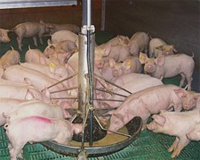Codex fails to approve feed additive ractopamine, NPPC disappointed

The National Pork Producers Council (NPCC) expressed strong disappointment in a U.N. commission’s failure to approve an international standard for a widely used feed additive.
The Codex Alimentarius Commission, which was established by the U.N.’s Food and Agriculture Organization and its World Health Organization to promote food safety and fair practices in trade, refused to adopt a science-based standard for ractopamine, a feed additive used to promote leanness in pork and beef. Establishment of a standard will be held at the final stage before approval for the fourth consecutive year.
Ractopamine, like all feed additives, was evaluated and approved by the U.S. Food and Drug Administration and has been approved for use in 26 countries, including Australia, Brazil, Canada, Indonesia, Mexico, the Philippines and South Korea.
A Codex panel of international scientists, including scientists from the European Union, three times has confirmed the safety of ractopamine and reaffirmed the safety of the product at this week’s commission meeting in Geneva, Switzerland.
Despite those findings and the support of the United States, Canada and countries in Africa, Asia, Latin America, and the Pacific Islands for adoption of the standard, opposition from the European Union, China, Thailand and Russia blocked it for non-scientific reasons outside the scope of the Codex. Except for Russia, those countries ban imports of pork from pigs fed
ractopamine.
“U.S. pork producers are very disappointed that the Codex commission succumbed to the bullying of countries that had no scientific reasons for opposing adoption of a standard for ractopamine,” said NPPC President Doug Wolf, a producer from Lancaster, Wis. “This is a scientifically proven safe product, and the commission failed again to act on its mandate to base standards and guidelines on science. This lack of action calls into question Codex’s legitimacy as the international reference body for scientific standards for food.”











